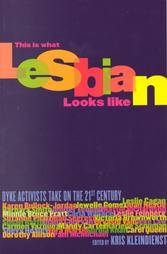This Is What Lesbian Looks Like
Dyke Activists Take on the 21st Century
Kris Kleindienst
One of the greatest civil rights success stories of the 20th century has been the movement for gay liberation, and the century’s end is the perfect–in fact, irresistible–moment for summing up its enormous but uneven achievements and for plotting its future. In This Is What Lesbian Looks Like, dyke activists reflect on race, class, conflict, and differences within the movement, and the rise of the religious right. Carol Queen pieces together her erotic awakenings amid the sex wars of the early 1970s. Dorothy Allison writes about her and her partner’s recent decision to move in with their son’s birth father and form their ‘own design of a happy family.’ Carmen Vazquez argues against the urge to conform, claiming that we are so wounded ‘by the denial of belonging, by the loss of family, community, and a right to faith in whatever we understand to be god, that we accept the absurdity and the illusion that we can belong to America’s family if we are ‘good.” If the collection as a whole strikes a less-than-celebratory note, it is a mark of the ground yet to cover, as well as the vigilance of those on the front lines. –Regina Marler
From Publishers Weekly
The 26 lesbian activists in this wandering collection are united in their dismay over the absence of a broad-based, grassroots social justice movement in the U.S. today. Lamenting a lack of political awareness among young people in particular, the authors pinpoint some of the predictable deterrents to effective organizing: internalized racism, homophobia, ageism and infighting. While they don’t offer a specific blueprint for change, these sometimes meditative, sometimes earnest essays (many of which have been reprinted or adapted from other contexts) weigh how all social concerns, not just gay and lesbian ones, are fundamentally interconnected. Although editor Kleindienst’s rhetorical introductions to every essay add a textbook feel, and a number of contributions suffer from pedestrian writing or familiar platitudes (‘Only in unity with each other and in coalition with our allies can we move ahead to achieve our common agenda’), readers will be drawn to familiar standouts, including Dorothy Allison (who, in an essay originally published in Harper’s, reflects on the hostility she encounters from the gay community when appearing in public with her straight-looking family), Joan Nestle, Urvashi Vaid and Barbara Smith (who succinctly characterizes good leadership as ‘humor, cooperation, reliability, humility, and kindness’). Among the appealing new voices is Surina Kahn’s, as she recalls how, as a Pakistani teenager, she thought the best way to assimilate herself in America was to vote Republican. Despite the volume’s hit-or-miss quality, it documents some forceful voices on everyday activism, even for those for whom ‘being out was all I could do.’ (Jan.)
Copyright 1999 Reed Business Information, Inc.
Check for it on:
Details
| ISBN | 9781563411168 |
| Genre | Anthology – Fiction |
| Publication Date | 30-Jun-99 |
| Publisher | Firebrand Books |
| Editor | Kris Kleindienst |
| Format | Trade Paperback |
| No. of Pages | 256 |
| Language | English |
| Rating | NotRated |
| Editor | Kris Kleindienst |
| Subject | Social Science |
| BookID | 13178 |
